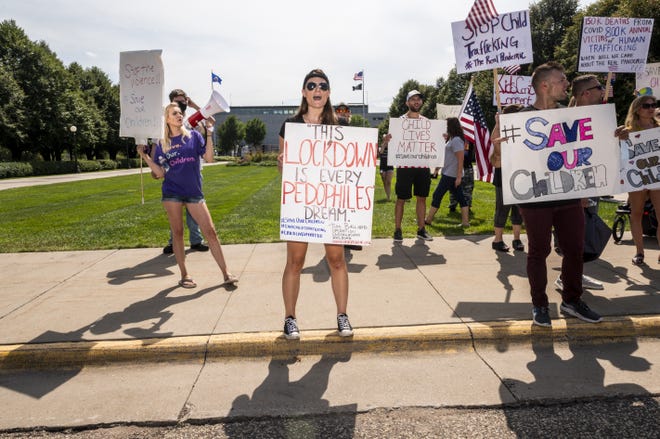Save the Children? Extremist conspiracy movement QAnon fabricates pedophile claims against Biden as election looms
- Hijacking #SaveTheChildren on social media is exposing unsuspecting Americans to QAnon ideology.
- Crimes against kids are foundational to many conspiracy theories as they’re universally horrifying.
- Viral spread of QAnon groups trigger a crackdown over the summer on Facebook, Instagram and Twitter.
President Donald Trump recently shared a tweet with his 86 million followers that accused his Democratic presidential challenger Joe Biden of being a pedophile.
It was not the first time that the baseless smear came out of the Trump camp. On Instagram in May, the president’s eldest son and campaign surrogate Donald Trump Jr. made a similar insinuation, which he later claimed was a joke.
How did unfounded allegations of pedophilia infiltrate American political life? They are a central tenet of the extremist conspiracy movement QAnon whose followers believe that Trump is a messianic figure battling a “deep state” of devil-worshipping, child-molesting Democrats.
Observers say the 2016 presidential election spurred the rise of conspiracy theories once confined to the fringes. With influential figures using their social media megaphones to amplify them, incendiary falsehoods are circulating in the mainstream before the November election in an alarming break from the norms of presidential politicking.
“I am amazed at how prevalent pedophilia has become in conspiracy theories just lately,” said Kathryn Olmsted, a UC Davis history professor who studies conspiracy theories and author of “Real Enemies: Conspiracy Theories and American Democracy.”
QAnon conspiracy theories: How QAnon is radicalizing Americans as the COVID-19 pandemic rages and election looms
Don’t be fooled:Debunked QAnon conspiracy theories are seeping into mainstream social media
QAnon is exploiting fears about the vulnerability of children and latching onto legitimate efforts to fight child abuse to push these allegations into everyday people’s social media feeds, said Michael Jensen, a senior researcher at the University of Maryland who leads a domestic radicalization team.
“Stories of child victimization are effective at mobilizing people to support a movement, even if it is based on conspiratorial views. We are seeing this now with QAnon’s use of the ‘Save the Children’ slogan, which has generated support from more mainstream individuals who do not necessarily subscribe to all aspects of the conspiracy,” Jensen said.
QAnon hijacked #SaveTheChildren
On the surface, #SaveTheChildren, which began as a fundraising campaign for the Save the Children charity, and a related hashtag #SaveOurChildren, don’t seem controversial. Who isn’t against child trafficking?
But the hijacking of the #SaveTheChildren hashtag on Facebook, Instagram and Twitter is exposing unsuspecting Americans to QAnon ideology. Some are turning out to rallies in cities across the country to call for an end to child exploitation.
In recent months, millions have seen anti-child trafficking memes, according to data from CrowdTangle, a public insights tool owned by Facebook. Between June 1 and Sept. 24, there were nearly 5.3 million interactions with posts on public pages and in public groups on Facebook that mentioned #SaveTheChildren. Public posts on Instagram had about another 11.6 million interactions.
According to data prepared for USA TODAY by media intelligence company Zignal Labs, Save the Children has received nearly 2.6 million mentions on Twitter since June 1.
Bogus #Pizzagate theories return
Melissa Ryan is CEO of CARD Strategies, a firm that helps organizations counter disinformation and extremism. Starting about six weeks ago, she began seeing members of her own family who had never mentioned child trafficking pipe up about it.
“It’s less of a barrier to entry to talk about child trafficking than it is to claim that every elite person in America is actually part of a massive pedophile ring,” Ryan said.
The phenomenon reminds her of rallies during the 2016 election for “Pizzagate,” a debunked conspiracy theory alleging that a secret cabal of elites operated a child sex trafficking ring out of a Washington, D.C., pizza restaurant. A North Carolina man traveled there and fired an assault weapon, endangering families and children.
“It was always shocking to me how many older women would be at these rallies,” Ryan said. “When you talked to them, they truly believed that Pizzagate had happened and that Hillary Clinton was a pedophile.”
Primal fears about the vulnerability of children have been exploited throughout history to push bogus allegations of ritual abuse, academic scholars say.
“If you want to call someone you don’t like the worst possible thing, Satanic sex-trafficking baby molester fits the bill. There’s really nothing worse you can call someone. There is no redemption after that,” said University of Miami associate professor of political science Joseph Uscinski, co-author of “American Conspiracy Theories.”

This brand of conspiracy mongering proliferated in the 1980s as the economy shifted and more women entered the workforce, says David Frankfurter, professor at Boston University and author of “Evil Incarnate: Rumors of Demonic Conspiracy and Satanic Abuse in History.”
QAnon exploits fears about children
Today, baseless claims of pedophilia are feeding off a toxic mix of extreme polarization and partisanship, growing distrust in public institutions, pandemic-fueled social isolation and a no-holds-barred online culture that can instantly propel dangerous misinformation into the mainstream, observers say.
The list of those targeted by false claims they prey on children is lengthy and includes Tom Hanks, Chrissy Teigen, Oprah, Justin Bieber, Barack Obama and Biden’s running mate Kamala Harris. None of them has ever faced a hint of impropriety with a child.
“Right now we are living through extremely unstable and uncertain times and that tends to make people even more anxious to look for answers and to look for villains,” Olmsted said.
Crimes against children are central to conspiracy theories
Crimes against children are the foundation of many conspiracy theories because they are so universally horrifying and can quickly explode into national obsessions, such as the disappearance of the Lindberg baby in the 1930s, the murder of JonBenét Ramsey in the 1990s and the sex-trafficking charges against convicted sex offender Jeffrey Epstein, says Emerson Brooking, resident fellow at the Atlantic Council’s Digital Forensic Research Lab.
“By portraying themselves as defenders of children and investigators of unspeakable crimes, the adherents of QAnon seek to seize the moral high ground. No matter how horrible the things they do, they can say that they are doing these things for a just cause,” Brooking said.

And that makes these insinuations dangerous, he warned. Dehumanizing political opponents can lead to violence.
“If you can be led to believe the person you disagree with is a monster, you can be convinced to support – even carry out – acts that once would have been considered unthinkable,” said Brooking, co-author of “LikeWar: The Weaponization of Social Media.
Facebook, Instagram crack down on Q
The viral spread of QAnon groups triggered a crackdown over the summer on Facebook, Instagram and Twitter.
The once explosive popularity of the #SaveTheChildren and #SaveOurChildren hashtags is showing signs of slowing. According to data analyzed by USA TODAY, posts with those hashtags peaked on Facebook on Aug. 10, shortly before Facebook removed hundreds of pages and groups tied to QAnon and blocked hundreds of hashtags across Facebook and Instagram. Hundreds more pages and groups on Facebook and thousands of accounts on Instagram remained on the platforms but faced restrictions.
“The QAnon folks have gotten smarter about it, too, and are no longer using terms that would identify them as Q’s. And so this is going to continue to be complicated,” Facebook’s head of cybersecurity policy Nathaniel Gleicher told USA TODAY. “They in particular are an interesting target because they’re pretty savvy about how to present as a right-of-center organization without showing too much evidence of the fact that they’re also associated with some other efforts around Q.”


